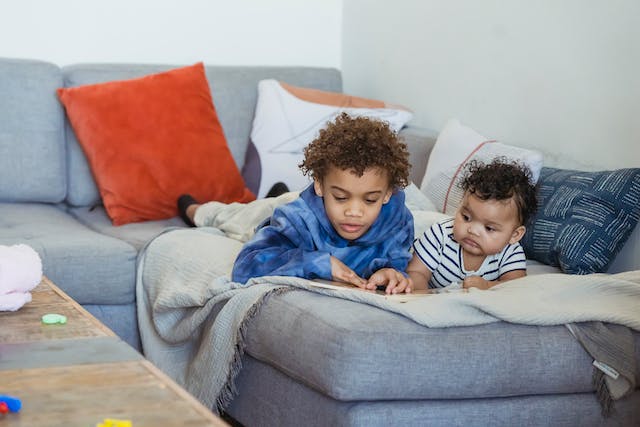Let’s look into the magical world of early childhood play and shine a spotlight on a topic that brings joy, laughter, and endless possibilities. Watching our little ones giggle, explore, and engage in play, we’re not just witnessing a delightful spectacle. We’re seeing the building blocks of cognitive, emotional, and social development that lay the foundation for a bright future. Join me on this journey as we explore the profound impact of Early Childhood Play and discover the beauty of Baby Development Activities.
Table of Contents
Playtime Unveiled: More Than Just Fun and Games

Unlocking Cognitive Potential:
When toddlers stack blocks or engage in imaginative play, they’re not merely passing the time but unlocking their cognitive potential. Play is the language of the developing brain, fostering creativity, problem-solving skills, and spatial awareness. The brain’s neural connections strengthen as children navigate the challenges presented by various play activities, setting the stage for enhanced cognitive abilities later in life.
Emotional Resilience and Regulation:
Playtime serves as a playground for emotional exploration. Whether it’s a game of make-believe or sharing toys with a playmate, children learn to navigate a spectrum of emotions. Through these experiences, they develop emotional resilience, learn to express their feelings and understand the nuances of empathy. Play becomes a safe space for emotional regulation, empowering children to manage their emotions healthily and constructively.
The Symphony of Early Childhood Play: A Multisensory Experience

Fine-Tuning Motor Skills:
From grasping toys to scribbling with crayons, play contributes to fine-tuning motor skills. These seemingly simple activities are the building blocks for more complex movements in the future. As children engage in various play experiences, they enhance their gross and fine motor skills, laying the groundwork for tasks like writing, tying shoelaces, and participating in sports.
Sensory Exploration:
Early childhood play is a multisensory experience that stimulates the senses. Children engage with the world through play, from the texture of playdough to the sound of musical instruments. This sensory exploration enhances their perceptual abilities and lays the foundation for language development and overall sensory integration.
Social Bonds and Communication: Play’s Ripple Effect

Building Social Bonds:
As children play together, they forge social bonds, contributing to their sense of belonging and connectedness. Through shared play experiences, they learn cooperation, negotiation, and the importance of taking turns. These early social interactions form the basis for developing essential social skills, setting the stage for healthy relationships in the future.
Language Development:
The chatter of children engaged in play is a symphony of language development. Space provides a rich context for language acquisition as children communicate, negotiate, and express themselves. Whether a pretend tea party or a make-believe adventure, exchanging ideas and stories during play enhances vocabulary, grammar, and overall language proficiency.
Parental Involvement: A Guiding Presence in Playtime

The Role of Parents in Early Childhood Play:
Parents, you are the guiding stars in your child’s playtime universe. Your active involvement amplifies the benefits of play. Join the fun, share their excitement, and let your imagination run wild together. Whether building a tower of blocks or embarking on a storytelling adventure, your presence adds warmth and encouragement to the joy of play.
Creating Playful Spaces at Home:
Transform your home into a haven of play by creating designated play spaces. These areas, equipped with age-appropriate toys and activities, serve as invitations for exploration and creativity. Remember that play doesn’t always have to be structured; sometimes, the best moments emerge from unstructured, free play where imagination takes center stage.
Navigating Screens in the Play Landscape: Balancing Act

Screen Time Guidelines:
In our increasingly digital world, navigating screen time is crucial to early childhood play. While some educational apps and programs can be beneficial, it’s essential to adhere to screen time guidelines recommended by pediatricians. Striking a balance between screen-based and traditional play ensures a holistic play experience that promotes well-rounded development.
Quality Over Quantity:
When it comes to play, quality prevails over quantity. Instead of an abundance of toys, focus on providing a variety that encourages diverse types of play. Rotate toys to keep the play environment fresh and engaging. Remember, it’s not about the number of toys but the richness of experiences they offer.
The Power of Imaginative Play: A Gateway to Creativity
Encouraging Imaginative Play:
Imaginative play is the gateway to creativity and innovation. Foster this aspect of play by encouraging your child to explore various roles and scenarios. Whether they’re pretending to be astronauts, chefs, or superheroes, imaginative play nurtures creativity, problem-solving, and the ability to think outside the box.
DIY Play Props:
You don’t need a treasure trove of elaborate toys to inspire imaginative play. Simple, everyday items can become the most cherished play props. Cardboard boxes transform into spaceships, blankets become magical forts, and kitchen utensils become instruments in the hands of a budding musician. Embrace the beauty of simplicity in play.
Early Childhood Play and Academic Readiness: A Symbiotic Relationship

The Bridge to Learning:
Play serves as a bridge to formal learning, creating a seamless transition into academic pursuits. The skills acquired through play—problem-solving, critical thinking, and social interaction—lay a strong foundation for future educational endeavors. Play is not a detour from learning; it’s an integral part of the journey.
Incorporating Learning into Play:
Infuse educational elements into playtime to enhance the learning experience. Simple counting games, letter recognition activities, and storytelling with educational themes seamlessly integrate learning into play. The goal is to make learning a joyful and organic part of your child’s play journey, fostering a positive attitude toward education.
Beyond Toys: Exploring Nature and Outdoor Play
The Nature Connection:
The great outdoors beckon as a playground for holistic development. Nature play stimulates curiosity, enhances physical activity, and offers sensory experiences. Whether exploring a local park, collecting leaves, or simply feeling the grass beneath their feet, outdoor play connects children with the natural world, fostering a sense of wonder and appreciation for the environment.
The Joy of Unstructured Outdoor Play:
Allow your child the freedom of unstructured outdoor play. Whether it’s running, climbing, or playing in the sand, unstructured playtime outdoors promotes physical fitness, emotional well-being, and a connection to the natural world. It’s an opportunity for your child to embrace the joy of movement and experience the wonders of the great outdoors.
Adapting Play to Developmental Milestones: A Parent’s Guide

Age-Appropriate Play:
As your child grows, their play preferences and abilities evolve. Tailor play activities to align with their developmental milestones. For infants, focus on sensory-rich activities and gentle interactions. Toddlers thrive on imaginative play and exploration, while preschoolers benefit from more complex games that involve rules and cooperation.
Observing Developmental Cues:
Pay close attention to your child’s developmental cues and interests. Their preferences and emerging skills provide valuable insights into the play activities that will resonate with them. Whether it’s a newfound love for building or an interest in artistic expression, adapting play to their developmental journey ensures a personalized and enriching experience.
Playful Moments, Lasting Memories
In parenthood, the threads of play weave a vibrant and intricate pattern. From the first moments of peek-a-boo to the imaginative adventures of make-believe spaceships, each playful interaction contributes to the masterpiece of your child’s development. As we champion the importance of Early Childhood Play, let’s embrace the laughter, the messiness, and the boundless imagination that define these precious moments. The bigger the mess, the more fun your child had.


